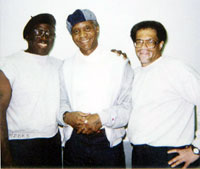Angola 3 hearing
Supporters mobilize, demand ‘Free Herman Wallace!’
By
Leslie Feinberg
Published Aug 14, 2006 8:50 PM
|
Herman Wallace, Robert King Wilkerson
and Albert Woodfox.
|
Supporters of the Angola 3 are traveling by
buses and vans, trains and planes to hold a vigil outside the walls of the
Louisiana State Penitentiary on Aug. 15, during prisoner Herman Wallace’s
evidentiary hearing inside.
Buses are already slated to leave from Austin,
Houston and Dallas, Texas; Law rence, Kan.; Oakland, Calif.; Tucson, Ariz.;
Chicago, Philadelphia and New York.
Common Ground and other
community-based organizations have scheduled buses from New Orleans.
The
Angola 3—Herman Wallace, Albert Woodfox and Robert King
Wilkerson—were sentenced to life without parole after their conviction for
the 1972 killing of a prison guard. Wilkerson proved his innocence and won
release in 2001.
Organizations all over the world, including Amnesty
International, have demanded freedom for the Angola 3. The parliaments of
Indonesia, Portugal, Belgium and Netherlands, and the African National Congress
in South Africa, have all denounced the decades of solitary imprisonment the men
have endured as “cruel and unusual punishment” and have recognized
the Angola 3 as “political prisoners.”
A recent BBC
investigative segment on the Angola 3, broadcast to some 25 million viewers,
reported that “there is powerful evidence that they were
framed.”
Spirit of Nat Turner
Supporters have long
stressed that the three prisoners were targeted by the administration because
they were courageous political activists inside the walls of the Louisiana State
Penitentiary at Angola.
The notoriously brutal, hard-labor state prison
farm—the biggest prison in the United States—sits atop 18,000 acres
of land that before the Civil War was a plantation cultivated by enslaved Black
laborers, most of them from the African country of Angola.
In 1972, all
the prison officials, really overseers, were white, while 80 percent of the
prisoners were Black. And it’s still true today. Prisoners labor from
sunup to sundown harvesting cotton, sugar cane and other cash crops. According
to “The Farm”—a documentary nominated for an Academy
Award—80 percent of prisoners sent to Angola will die there.
The men
who later became known as the Angola 3 founded one of the only recognized prison
Black Panther chapters in 1971. They tried to organize against Jim Crow
segregation in order to bring Black and white prisoners toge ther to desegregate
“The Farm” and defend fellow prisoners against systematic rape and
violence.
The three tried to mobilize a movement to win better living
conditions. They provided their experience as “jail-house lawyers”
to help other prisoners. They set up political education programs for prisoners.
And they organized work stoppages and dining hall strikes.
After a
guard’s death in 1972, the administration unleashed a wave of terror
against Black prisoners: beatings, forcibly shaving the heads of African
American prisoners who grew Afros, and mass solitary confinement.
Few
prisoners in world history have been held in solitary as long as the Angola 3.
Robert Wilkerson spent 29 years before his release. Wallace and Woodfox have
spent 34 years locked up in solitary, 23 hours a day, in 6-by-9 foot
cells—sweltering without air conditioning in Loui siana
summers.
This is a critical moment
The two men charge that
state witnesses against them were prison “snitches,” bribed with
favors in return for their testimony.
Three prosecution witnesses have
since confessed that they lied on the stand and have recanted their testimony.
Eye witnesses have identified the prisoner, now dead, who they say actually
killed the guard. Yet the Louisiana courts have not yet ruled on this
evidence.
The Louisiana State Court of Appeals has now ordered an
evidentiary hearing into Herman Wallace’s charge that the state hid the
fact that prison officials paid off the chief witness at his 1974 trial with a
pardon of his life sentence and ongoing supplies of cigarettes. That hearing
will take place Aug. 15 to 17, if all three days are required.
Longtime
Angola 3 lawyer Scott Fleming, explaining the importance of this evidentiary
hearing, says Wallace’s conviction could be overturned if the state court
finds that the state offered favors to the prosecution witness and did not
disclose this fact to the defense or the jury, and that this suppression of
evidence could have contributed to his conviction.
This explains the
importance of a vigil outside the walls of the prison scheduled for the time of
the hearing on Aug. 15. Supporters are alerted, however, to the fact that the
location could shift to Baton Rouge, based on a request for change of
venue.
At the same time, the U.S. Supreme Court has ruled that there is
merit to a civil lawsuit filed by all of the Angola 3, charging that their years
in solitary confinement violate their right to due process and are cruel and
unusual punishment. The lawsuit is moving ahead in federal court and could go to
trial in the autumn.
For more information, visit www.Angola3.org. Details
about the feature-length documentary film on their struggle—“3 Black
Panthers & the Last Slave Plantation”—can be found at
3BlackPanthers.com.
Articles copyright 1995-2012 Workers World.
Verbatim copying and distribution of this entire article is permitted in any medium without royalty provided this notice is preserved.
Workers World, 55 W. 17 St., NY, NY 10011
Email:
ww@workers.org
Subscribe
wwnews-subscribe@workersworld.net
Support independent news
DONATE


